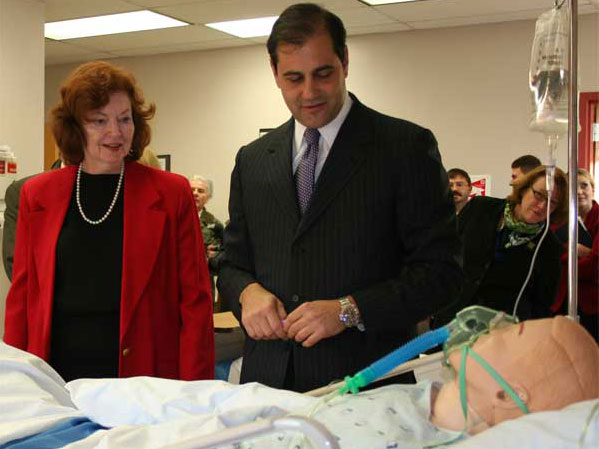The College of Staten Island has a new state-of-the-art, high-fidelity nursing simulation lab, thanks to a $150,000 endowment secured by New York State Senator Andrew Lanza. The Senator officially opened the lab at a ribbon-cutting ceremony this afternoon on the College’s Willowbrook campus.
Saying that “nurses are really the backbone of the health care delivery system,” Senator Lanza added that it’s “just so nice to see that right here on Staten Island we have this center for nursing education excellence.” Nursing Department faculty and students also treated the Senator to a demonstration of some of the lab’s equipment.
CSI President Tomás Morales called Senator Lanza a “real champion of the College…and someone who is dedicated 24/7 to the people of Staten Island.”
Mary O’Donnell, Chairperson of CSI’s Department of Nursing, said that the new facility “is an approach to experiential learning that is learner-centered, integrated, [and promotes] cognitive, psychomotor, and affective domains of learning through the use of high-fidelity simulation mannequins.”
In the past, O’Donnell explained, simulation mannequins were motionless. These new models actually talk, breathe, and have vital signs. “For the most part,” O’Donnell noted, “this is done primarily to create a safe and effective learning opportunity based on active learning techniques in a high-tech, high-fidelity environment with state-of-the art equipment. What we’re really looking at is providing for patient safety and medical errors that are embedded within simulation clinical experiences so students will be able to pick out what could have happened and correct what they need to correct in a very safe environment.”
Beyond providing for the new mannequins, O’Donnell said that the endowment is also making it possible for a videotaping system that records students as they interact with the mannequins. She points out that “we can now videotape the students as they are performing and we have a debriefing session in which the students and the instructors can evaluate what was good, what needs to be improved, how things could be done better…which is important in adult learning.”
Currently, the new lab is geared more toward helping students in the Nursing Associate’s degree program, but O’Donnell adds that the department will also seek ways to engage Bachelor’s and Master’s students.
As for her feelings on the new facility, O’Donnell explained, “I’m very pleased at [the lab] we have because I think that it is much more updated and complete. I think that it’s exciting because it’s a really great opportunity for both the students and the instructors to promote teaching and learning. It will definitely make patients feel much better when they are being cared for because there will be a new degree of confidence after students have had the opportunity to play out various scenarios and have to do critical thinking on their feet in a very safe environment—that’s the critical piece. We want to be sure that it’s a safe environment and they have a comfortable feeling of testing their wings.”

















